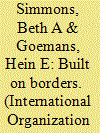|
|
|
Sort Order |
|
|
|
Items / Page
|
|
|
|
|
|
|
| Srl | Item |
| 1 |
ID:
178565


|
|
|
|
|
| Summary/Abstract |
The Liberal International Order is in crisis. While the symptoms are clear to many, the deep roots of this crisis remain obscured. We propose that the Liberal International Order is in tension with the older Sovereign Territorial Order, which is founded on territoriality and borders to create group identities, the territorial state, and the modern international system. The Liberal International Order, in contrast, privileges universality at the expense of groups and group rights. A recognition of this fundamental tension makes it possible to see that some crises that were thought to be unconnected have a common cause: the neglect of the coordinating power of borders. We sketch out new research agendas to show how this tension manifests itself in a broad range of phenomena of interest.
|
|
|
|
|
|
|
|
|
|
|
|
|
|
|
|
| 2 |
ID:
100147


|
|
|
|
|
| Publication |
2010.
|
| Summary/Abstract |
Comparative interregionalism is often limited to the policy or panoramic dimension, reducing local differences and specificities, the "minute particulars" (Blake, William Blake's Writings, 614, 620, 1978) of the lifeworld to their more abstract forms. This is particularly the case when the European Union (EU) and Association of Southeast Asian Nations (ASEAN) are compared: generalities remain abstractions, whereas the sharper the focus the more diffferentiated the mindscape becomes and the more the basis for the comparison is undermined. Yet, in a global knowledge networked economy (to get all the buzzwords in one phrase), comparisons are necessary if often invidious. While commentators are often reluctant to see the EU as a model for ASEAN, it is often seen as a complex of experiences to be shared. Yet what-in this domain-gets exported, transplanted and implanted elsewhere, how does this transference take place in such an internetted society, and to what end? Seen in an interregional, even global context, and including an examination of teaching Günter Grass' Crabwalk (Im Krebsgang, 2002) in English translation to undergraduates of a contemporary European literature class at the National University of Singapore, the paper hopes to indicate some temporal and spatial contexts of transplantation and the means by which this is achieved.
|
|
|
|
|
|
|
|
|
|
|
|
|
|
|
|
|
|
|
|
|